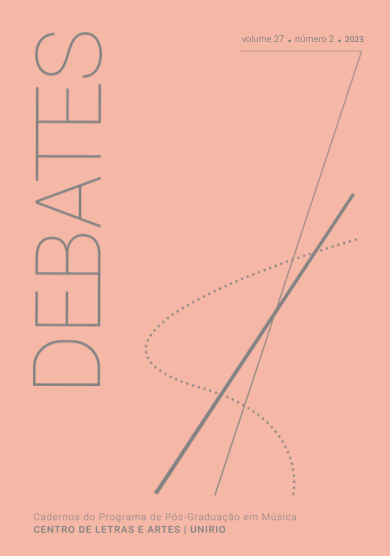La apropiación de los golpes de arco a través de la tutoría entre pares en el aula de violín
Keywords:
Musical instrument education, violin learning, peer tutoring, bow strokes, appropriationAbstract
Despite the fact that musical practices are eminently group activities, the cultural tradition of scholarly music teaching is highly regulated and depends on individual learning, in which knowledge is transferred directly from teacher to student. Faced with this reality, peer tutoring turns out to be an interesting strategy in musical instrument teaching and learning, because it proposes a model in which level differences are not seen as a problem but rather as a resource. With bowed string instruments, in order to achieve richness in the interpretation of various articulations, it is necessary to master the right hand technique called bow strokes. The objective of this study is to analyze elementary violin students’ appropriation of two bow strokes (spiccato and martelé) through peer tutoring. To this end, a complementary didactic intervention in the violin classes has been developed and implemented. The study focuses on a couple with fixed roles and is analyzed under the qualitative paradigm as a case study, with the tutor being 16 years old and the mentee being 12. The data are obtained through videos of the sessions, observation sheets of the violin teacher and questionnaires for the students, which are analyzed and later triangulated. The results show that peer tutoring facilitates the appropriation of spiccato and martelé on the violin, especially for the student with the role of tutor. These results coincide with other previous works on the identification of key aspects of appropriation in peer tutoring and are added, as a contribution, to the specific area of musical instrument education.
Downloads
References
ALLEN, Vernon. Children as teachers: Theory and research on tutoring. New York: Academic Press, 1976.
BAÑO, Lucas; POZO, Juan Ignacio. Del aprendizaje individual al aprendizaje cooperativo. In: J.I. Pozo, M.P. Pérez Echeverría, J.A. Torrado y G. López-Íñiguez (Coords.), Aprender y enseñar música. Un enfoque centrado en los alumnos (pp. 307-324). Madrid: Morata, 2020.
BAKHTIN, Mikhail. Discourse in the novel (M. Holquist & C. Emerson, Trans.). In: M. Holquist (Ed.). The dialogic imagination (pp. 259-422). Austin: University of Texas Press, 1981.
BAUTISTA, Nelly. Proceso de la investigación cualitativa: epistemología, metodología y aplicaciones. Bogotá: El Manual Moderno, 2011.
CASAS- MAS, Amalia; POZO, Juan Ignacio; MONTERO, Ignacio. The Influence of Music Learning Cultures on the Construction of Teaching-Learning Conceptions. In: British Journal of Music Education, v.31, n.3, p. 319–342, 2014. DOI: 10.1017/ S0265051714000096
COLLAZOS, César Alberto; GUERRERO, Luis; VERGARA, Adriana. Aprendizaje colaborativo: un cambio en el rol del profesor. Memorias del III Congreso de Educación Superior en Computación, Jornadas Chilenas de la Computación. Punta Arenas, Chile, 2001. Disponible en http://www.dcc.uchile.cl/~luguerre/papers/CESC-01.pdf. Recuperado el 18 de abril de 2017.
DURAN, David. Aprenseñar: Evidencias e implicaciones educativas de aprender enseñando. Madrid: Narcea, 2014.
DURAN, David. ¿Se puede aprender enseñando? Evidencias científicas e implicaciones educativas. In: Aula de Innovación Educativa, v.259, p. 35–40, 2017.
DURAN, David; VIDAL, Vinyet. Tutoría entre iguales: de la teoría a la práctica: Un método de aprendizaje cooperativo para la diversidad en secundaria. Barcelona: Graó, 2004.
FERNÁNDEZ- BARROS, Andrea; DURAN, David; VILADOT, Laia. Peer tutoring as a tool for developing the intonation of violin and viola students in elementary music education. In: Music Education Research, v. 25, n. 2, p. 176-189, 2023. https://doi.org/10.1080/14613808.2023.2193210
FERNÁNDEZ- BARROS, Andrea; DURAN, David; VILADOT, Laia. Oídos a pares. Un proyecto de tutoría entre iguales para el desarrollo de la afinación y la percepción auditiva en el alumnado de violín y viola. Revista Electrónica LEEME, v. 45, p. 1-16, 2020. DOI: 10.7203/LEEME.45.16062
FLORES, Marta y DURAN; David. “Razonar en pareja”. In: Cuadernos de pedagogía, v.476, p. 79-81, 2017.
GALAMIAN, Ivan. Interpretación y enseñanza del violín. Madrid: Pirámide, 1998.
GLASER, Barney; STRAUSS, Anselm. The Discovery of Grounded theory: strategies for qualitative research. Chicago: Aldine Pub. Co, 1967.
GONZÁLEZ LAPUENTE, Alberto. Diccionario de la Música. Madrid: Alianza, 2003
JONHNSON, David; JOHNSON, Roger; y HOLUBEC, Edythe. El aprendizaje cooperativo en el aula. Barcelona: Paidós, 1999.
MOLINER, Lidón; MOLINER, Odet; SALES, Auxiliadora. Porque solos no aprendemos mucho: Una experiencia de tutoría entre iguales recíproca en Educación Primaria. In: Revista de Investigación Educativa, v.30, n. 2, p. 459-474, 2012.
QUIROZ, Rafael. Obstáculos para la apropiación del contenido académico en la escuela secundaria. In: Infancia y Aprendizaje, v. 55, p. 45-58, 1991.
QUIROGA-FUENTES, Isabel; ANGEL-ALVARADO, Rolando. Prácticas inclusivas en orquestas infanto-juveniles: Un estudio de caso en Chile. In: Artseduca, 28, pp.142-153, 2021.
ROGOFF, Barbara. Observing sociocultural activity on three planes: Participatory appropriation, guided participation, and apprenticeship. In: J. V. Wertsch, P. del Río, & A. Alvarez (Eds.), Sociocultural studies of mind (pp. 139–164). Cambridge: Cambridge University Press, 1995
SHELDON, Deborah. Peer and Cross-Age Tutoring in Music. Peer and cross-age tutoring allows music students to help each other and benefits both the music teacher and the students themselves. In: Music Educators Journal, v. 87, p. 33-38, 2001.
STAKE, Robert. Investigación con estudio de casos. Madrid: Morata, 1999.
VILADOT, Laia. De la poesia a la composició musical col·lectiva: una experiència a l'escola de música. Temps d'Educació, v.42, p. 93-110, 2012.
VILADOT, Laia; GÓMEZ, Isabel; MALAGARRIGA, Teresa. Sharing meanings in the music classroom. European Journal of Psychology of Education, v.25, p. 49-65, 2010.
WELLS, Gordon. Indagación dialógica. Hacia una teoría y una práctica socioculturales de la educación. Barcelona: Paidós, 2001.
Downloads
Published
How to Cite
Issue
Section
License
Copyright (c) 2024 DEBATES - Cadernos do Programa de Pós-Graduação em Música

This work is licensed under a Creative Commons Attribution-NonCommercial-ShareAlike 4.0 International License.


